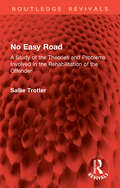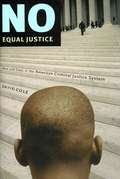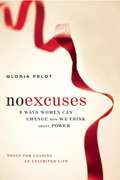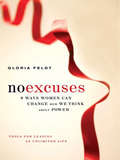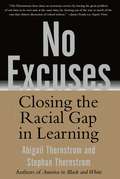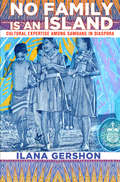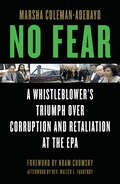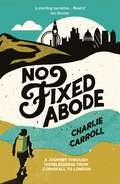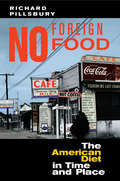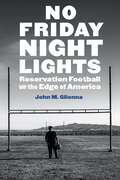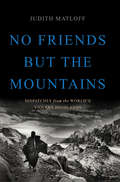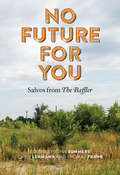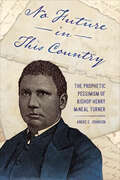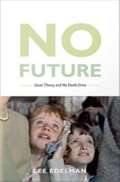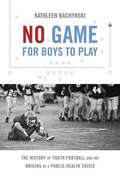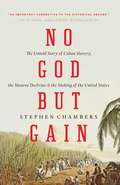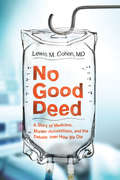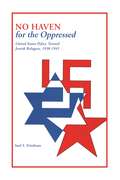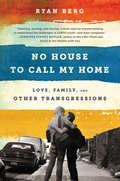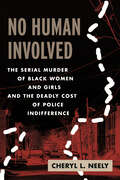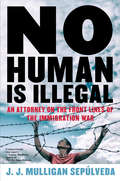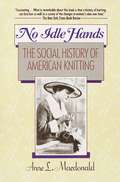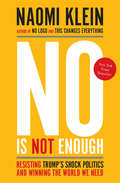- Table View
- List View
No Easy Road: A Study of the Theories and Problems Involved in the Rehabilitation of the Offender (Routledge Revivals)
by Sallie TrotterOriginally published in 1969, Sallie Trotter was the first woman social worker ever appointed in Britain to work inside an all-male prison – Wandsworth, in fact – with more freedom than had hitherto been offered to anyone not strictly of the prison staff. She was made responsible for the welfare and rehabilitation of over 1,500 men, none of them first-offenders. No Easy Road is the product of an experience that is quite unique.The first part is an account of her experiences within the prison walls, of the prison and its staff and of the criminals themselves; also of the day to day routine and problems raised by her unusual situation as a woman among so many tough and possibly dangerous men. The second part considers the theories of others with regard to treatment of the criminal and the author’s own attempts to analyse them. The third part is devoted to the author’s own ideas, for instance, on rehabilitation, the moral issues, and the factors that turn a man into a criminal.It is a serious book, but the author brings a completely fresh mind to bear on problems which have for too long been a male monopoly, whether the writers have been former officials and inmates, or outside critics and reformers. This new viewpoint seems to have been highly successful in the prison itself, and it certainly makes her book wholly absorbing. She has many valuable ideas to contribute and many interesting stories to relate, and the way in which her own personality emerges is particularly striking.With prisons and prisoners still very much in the public eye, this study continues to hold relevance today.
No Equal Justice: Race and Class in the American Criminal Justice System
by David ColeIn a hard-hitting study hailed by "Publishers Weekly" as "well-argued" and "passionate," a leading constitutional scholar reveals that, despite a veneer of neutrality, race- and class-based double standards operate in virtually every criminal justice setting, from police behavior to jury selection to sentencing.
No Excuses: 9 Ways Women Can Change How We Think About Power
by Gloria FeldtThrough interviews, historical perspective, and anecdotes, feminist icon Feldt examines why barriers to gender equality still exist in American society, and explains nine ways women can change how they think about power.
No Excuses: 9 Ways Women Can Change How We Think about Power
by Gloria FeldtFeminist icon Gloria Feldt pulls no punches in this new book, which argues that the most confounding problem facing women today isn't that doors of opportunity aren't open, but that not enough women are walking through them. From the boardroom to the bedroom, public office to personal relationships, she asserts that nobody is keeping women from parity-except themselves.Feldt puts women's power into an historical context, showing the ways in which women have made huge leaps forward in the past, only to pull back right when they were at the threshold. Feldt argues that there's no excuse-whether it's the way women are socialized, or pressure to conform, or work/life balance issues-for women today not to own their power. Women are still facing unequal pay, being passed over for promotions, entering public office at a much lesser rate than men, and oftentimes still struggling with traditional power dynamics in their interpersonal relationships. Feldt's solution to all these places where women face inequality is the same: we need to shift the way we think to achieve true parity with our male counterparts.No Excuses is divided into nine chapters that organized around how women can change the way they think, and therefore the way they act. These include: Know Your History and You Can Create the Future of Your Choice; Define the Terms-First; Embrace Controversy; Employ Every Medium; and other helpful ideas for using the tools and resources women already have to create the changes they want to see. No Excuses is a timely and invaluable book to help women equalize gender power in politics, work, and love.
No Excuses: Closing the Racial Gap in Learning
by Stephan Thernstrom Abigail ThernstromThe racial gap in academic performance between whites and Asians, on the one hand, and Latinos and blacks, on the other hand, is America's most urgent educational problem. It is also the central civil rights issue of our time, say Abigail and Stephan Thernstrom. Unequal skills and knowledge are the main sources of ongoing racial inequality, and racial inequality is America's great unfinished business. A wide and tragic gap in learning is evident in affluent suburbs as well as inner cities. But great schools are scattered across the country, as described in inspiring detail by the Thernstroms. These schools are putting even the most highly disadvantaged children on the American ladder of economic opportunity. There are no good excuses for the perpetuation of long-standing inequalities, the Thernstroms argue eloquently. The problem can be solved, but conventional strategies will not work. Fundamental educational reform is needed. Carefully researched, accessibly written, and powerfully persuasive, this book offers both a close analysis of the current landscape and a blueprint for essential and overdue change.
No Family Is An Island: Cultures and Technologies of Knowledge)
by Ilana GershonGovernment bureaucracies across the globe have become increasingly attuned in recent years to cultural diversity within their populations. Using culture as a category to process people and dispense services, however, can create its own problems and unintended consequences. In No Family Is an Island, a comparative ethnography of Samoan migrants living in the United States and New Zealand, Ilana Gershon investigates how and when the categories "cultural" and "acultural" become relevant for Samoans as they encounter cultural differences in churches, ritual exchanges, welfare offices, and community-based organizations. In both New Zealand and the United States, Samoan migrants are minor minorities in an ethnic constellation dominated by other minority groups. As a result, they often find themselves in contexts where the challenge is not to establish the terms of the debate but to rewrite them. To navigate complicated and often unyielding bureaucracies, they must become skilled in what Gershon calls "reflexive engagement" with the multiple social orders they inhabit. Those who are successful are able to parlay their own cultural expertise (their "Samoanness") into an ability to subtly alter the institutions with which they interact in their everyday lives. Just as the "cultural" is sometimes constrained by the forces exerted by acultural institutions, so too can migrant culture reshape the bureaucracies of their new countries. Theoretically sophisticated yet highly readable, No Family Is an Island contributes significantly to our understanding of the modern immigrant experience of making homes abroad.
No Fear: A Whistleblower's Triumph Over Corruption and Retaliation at the EPA
by Noam Chomsky Rev Walter E. Fauntroy Marsha Coleman-AdebayoRetracing the steps of the first civil rights and whistleblower act of the 21st century, this chronicle follows young, black, MIT-educated social scientist Marsha Coleman-Adebayo, shortly after she landed her dream job at the Environmental Protection Agency (EPA). The account illustrates how the author attempted to convince the government to investigate allegations surrounding a multinational corporation, suspecting that they were responsible for the deaths of hundreds of South Africans who were mining vanadium--a vital strategic mineral. Documenting Coleman-Adebayo's shocking discovery that the EPA itself was the first line of defense for the corporation in question, this record depicts how the agency stonewalled, prompting the author to expose them. The agency's brutal retaliation is captured in detail, revealing their use of every racist and sexist trick in their playbook, costing the protagonist her career, endangering her family, and sacrificing more lives in the vanadium mines of South Africa. Finishing on a hopeful note, the recollection concludes with the upwelling of support the author received from others in the federal bureaucracy, detailing how her subsequent grassroots struggle to protect future whistleblowers ended in victory.
No Filter: The Good, the Bad, and the Beautiful
by Paulina Porizkova&“A book about a rare life, profound love, profound grief, anxiety, self-assurance, empowerment, aging, loss, and joy. It is nuanced, complex, insightful, helpful, and constantly surprising.&” —Ann Patchett, New York Times bestselling author of These Precious DaysWriter and former model Paulina Porizkova pens a series of intimate, introspective, and enlightening essays about the complexities of womanhood at every age, pulling back the glossy magazine cover and writing from the heart. Born in Cold War Czechoslovakia, Paulina Porizkova rose to prominence as a model, appearing on her first Sports Illustrated Swimsuit Issue cover in 1984. As the face of Estée Lauder in 1989, she was one of the highest-paid models in the world. When she was cast in the music video for the song &“Drive&” by The Cars, it was love at first sight for her and frontman Ric Ocasek. He was forty at the time, and Porizkova was nineteen. The decades to come would bring marriage, motherhood, a budding writing career; and later sadness, loneliness, isolation, and eventually divorce. Following her ex-husband&’s death—and the revelation of a deep betrayal—Porizkova stunned fans with her fierce vulnerability and disarming honesty as she let the whole world share in her experience of being a woman who must start over. This is a wise and compelling exploration of heartbreak, grief, beauty, aging, relationships, re-invention and finding your purpose. In these essays, Porizkova bares her soul and shares the lessons she&’s learned—often the hard way. After a lifetime of being looked at, she is ready to be heard.
No Fixed Abode: A Journey Through Homelessness from Cornwall to London
by Charlie CarrollCharlie’s teaching contract came to an end and he found himself with no job and no money, but all the time in the world. He decided to travel from Cornwall to London in remarkably cheap way – as a tramp, on foot. With a mix of travel and current affairs writing, No Fixed Abode sheds light on a side of the UK few ever see from within.
No Fixed Abode: A Journey Through Homelessness from Cornwall to London
by Charlie CarrollCharlie’s teaching contract came to an end and he found himself with no job and no money, but all the time in the world. He decided to travel from Cornwall to London in remarkably cheap way – as a tramp, on foot. With a mix of travel and current affairs writing, No Fixed Abode sheds light on a side of the UK few ever see from within.
No Foreign Food: The American Diet In Time And Place
by Richard PillsburyNo Foreign Food explores the evolution and transformation of the American diet from colonial times to the present. How and why did our bland colonial diet evolve into today's restless mlange of exotic foods? Why are Hoppin' Jon, lutefisk, and scrapple, once so important, seldom eaten today? How has the restaurant shaped our daily menus? These and hundreds of other questions are addressed in this examination of the changing American diet. } No Foreign Food explores the evolution and transformation of the American diet from colonial times to the present. How and why did our bland colonial diet evolve into today's restless mlange of exotic foods? Why are Hoppin' Jon, lutefisk, and scrapple, once so important, seldom eaten today? How has the restaurant shaped our daily menus? These and hundreds of other questions are addressed in this examination of the changing American diet.Appropriately, Richard Pillsbury reviews the colonial American diet and its evolution from its Old World origins to the impact of the Industrial Revolution on food. He emphasizes the roles of transportation development and technological change, the rise of great food companies, the changing role of the food distribution system, the impact of changing immigration patterns, and the ways that cookbooks reflect and shape our foodways.The book concludes with an examination of America's contemporary cuisine. Noting current trends at home and in restaurants, Pillsbury reflects on the changing character of the new American diet, the growing nationalization and declining regionalization of what and how we eat, and a future where there is no foreign food. }
No Friday Night Lights: Reservation Football on the Edge of America
by John M. GlionnaNo Friday Night Lights is the story of a rural Nevada high school football team that never wins. Veteran reporter John M. Glionna examines the 2022 season in which the McDermitt Bulldogs practiced for weeks in the summer only to learn once again that they had come up short of the necessary players due to the dwindling population on the Fort McDermitt Indian Reservation on the Nevada-Oregon border. Eight-man football helps give the coaches and kids a sense of community—despite a lack of wins, and despite their home&’s status as one of the most remote locations for a public school in the West. Glionna&’s relationships with coaches, players, parents—and even those McDermitt residents remotely connected to high school football—provide telling insights into local lives, many of them from the Paiute and Shoshone tribes of Fort McDermitt. Although victory and recognition elude the players, Glionna illuminates their hard work and dedication—leaving the reader with glimpses of life on the ground in &“flyover&” country.
No Friends but the Mountains: Dispatches from the World's Violent Highlands
by Judith MatloffA veteran war correspondent journeys to remote mountain communities across the globe-from Albania and Chechnya to Nepal and Colombia-to investigate why so many conflicts occur at great heightsMountainous regions are home to only ten percent of the world's population yet host a strikingly disproportionate share of the world's conflicts. Mountains provide a natural refuge for those who want to elude authority, and their remoteness has allowed archaic practices to persist well into our globalized era.As Judith Matloff shows, the result is a combustible mix we in the lowlands cannot afford to ignore. Traveling to conflict zones across the world, she introduces us to Albanian teenagers involved in ancient blood feuds; Mexican peasants hunting down violent poppy growers; and Jihadists who have resisted the Russian military for decades. At every stop, Matloff reminds us that the drugs, terrorism, and instability cascading down the mountainside affect us all.A work of political travel writing in the vein of Ryszard Kapuscinski and Robert Kaplan, No Friends but the Mountains is an indelible portrait of the conflicts that have unexpectedly shaped our world.
No Future for You: Salvos from The Baffler (The\mit Press Ser.)
by Baffler BooksA new collection on carnival hokum and magical thinking in post-apocalypse America—brought to you by The Baffler.There's never been a better time to be outside the consensus—and if you don't believe it, then peer into these genre-defining essays from The Baffler, the magazine that's been blunting the cutting edge of American culture and politics for a quarter of a century. Here's Thomas Frank on the upward-falling cult of expertise in Washington, D.C., where belonging means getting the major events of our era wrong. Here's Rick Perlstein on direct mail scams, multilevel marketing, and the roots of right-wing lying. Here's John Summers on the illiberal uses of innovation in liberal Cambridge, Massachusetts. And here's David Graeber sensing our disappointment in new technology. (We expected teleportation pods, antigravity sleds, and immortality drugs. We got LinkedIn, which, as Ann Friedman writes here, is an Escher staircase masquerading as a career ladder.) Packed with hilarious, scabrous, up to-the-minute criticism of the American comedy, No Future for You debunks “positive thinking” bromides and business idols. Susan Faludi debunks Facebook executive Sheryl Sandberg's phony feminist handbook, Lean In. Evgeny Morozov wrestles “open source” and “Web 2.0” and other pseudorevolutionary meme-making down to the ground. Chris Lehmann writes the obituary of the Washington Post, Barbara Ehrenreich goes searching for the ungood God in Ridley Scott's film Prometheus, Heather Havrilesky reads Fifty Shades of Grey, and Jim Newell investigates the strange and typical case of Adam Wheeler, the student fraud who fooled Harvard and, unlike the real culprits, went to jail.No Future for You offers the counternarrative you've been missing, proof that dissent is alive and well in America. Please be warned, however. The writing that follows is polemical in nature. It may seek to persuade you of something.Copublished with The Baffler. ContributorsChris Bray, Mark Dancey, Barbara Ehrenreich, Susan Faludi, Thomas Frank, Ann Friedman, James Griffioen, David Graeber, A. S. Hamrah, Heather Havrilesky, Chris Lehmann, Rhonda Lieberman, Anne Elizabeth Moore, Evgeny Morozov, Jim Newell, Rick Perlstein, John Summers, Maureen Tkacik
No Future in This Country: The Prophetic Pessimism of Bishop Henry McNeal Turner (Race, Rhetoric, and Media Series)
by Andre E. JohnsonWinner of the 2021 Book of the Year Award from the Religious Communication AssociationWinner of the 2021 Top Book Award from the National Communication Association's African American Communication and Culture Division & Black CaucusNo Future in This Country: The Prophetic Pessimism of Bishop Henry McNeal Turner is a history of the career of Bishop Henry McNeal Turner (1834–1915), specifically focusing on his work from 1896 to 1915. Drawing on the copious amount of material from Turner’s speeches, editorial, and open and private letters, Andre E. Johnson tells a story of how Turner provided rhetorical leadership during a period in which America defaulted on many of the rights and privileges gained for African Americans during Reconstruction. Unlike many of his contemporaries during this period, Turner did not opt to proclaim an optimistic view of race relations. Instead, Johnson argues that Turner adopted a prophetic persona of a pessimistic prophet who not only spoke truth to power but, in so doing, also challenged and pushed African Americans to believe in themselves. At this time in his life, Turner had no confidence in American institutions or that the American people would live up to the promises outlined in their sacred documents. While he argued that emigration was the only way for African Americans to retain their “personhood” status, he also would come to believe that African Americans would never emigrate to Africa. He argued that many African Americans were so oppressed and so stripped of agency because they were surrounded by continued negative assessments of their personhood that belief in emigration was not possible. Turner’s position limited his rhetorical options, but by adopting a pessimistic prophetic voice that bore witness to the atrocities African Americans faced, Turner found space for his oratory, which reflected itself within the lament tradition of prophecy.
No Future: Queer Theory and the Death Drive
by Lee EdelmanIn this searing polemic, Lee Edelman outlines a radically uncompromising new ethics of queer theory. His main target is the all-pervasive figure of the child, which he reads as the linchpin of our universal politics of "reproductive futurism. " Edelman argues that the child, understood as innocence in need of protection, represents the possibility of the future against which the queer is positioned as the embodiment of a relentlessly narcissistic, antisocial, and future-negating drive. He boldly insists that the efficacy of queerness lies in its very willingness to embrace this refusal of the social and political order. In No Future, Edelman urges queers to abandon the stance of accommodation and accede to their status as figures for the force of a negativity that he links with irony, jouissance, and, ultimately, the death drive itself. Closely engaging with literary texts, Edelman makes a compelling case for imagining Scrooge without Tiny Tim and Silas Marner without little Eppie. Looking to Alfred Hitchcock's films, he embraces two of the director's most notorious creations: the sadistic Leonard of North by Northwest, who steps on the hand that holds the couple precariously above the abyss, and the terrifying title figures of The Birds, with their predilection for children. Edelman enlarges the reach of contemporary psychoanalytic theory as he brings it to bear not only on works of literature and film but also on such current political flashpoints as gay marriage and gay parenting. Throwing down the theoretical gauntlet, No Future reimagines queerness with a passion certain to spark an equally impassioned debate among its readers.
No Game for Boys to Play: The History of Youth Football and the Origins of a Public Health Crisis
by Kathleen BachynskiThis book is divided into four thematically organized sections. The first examines the emergence of high school and college football in the United States. The second section focuses on midcentury efforts to study football as a medical issue, including the development of sports medicine and debates over what constituted an injury attributable to playing football. Third, it explores how doctors, coaches, sports administrators, and sporting goods manufacturers managed the physical and financial hazards of football, and to whom they attributed responsibility for the injuries that occurred. Finally, it examines the changing demographics of youth football and the increasing corporate power of the NFL.
No God But Gain
by Stephen ChambersFrom 1501 to 1867 more than 12.5 million Africans were brought to the Americas in chains, and many millions died as a result of the slave trade. The US constitution set a 20-year time limit on US participation in the trade, and on January 1, 1808, it was abolished. And yet, despite the spread of abolitionism on both sides of the Atlantic, despite numerous laws and treaties passed to curb the slave trade, and despite the dispatch of naval squadrons to patrol the coasts of Africa and the Americas, the slave trade did not end in 1808. Fully 25 percent of all the enslaved Africans to arrive in the Americas were brought after the US ban - 3.2 million people.This breakthrough history, based on years of research into private correspondence; shipping manifests; bills of laden; port, diplomatic, and court records; and periodical literature, makes undeniably clear how decisive illegal slavery was to the making of the United States. US economic development and westward expansion, as well as the growth and wealth of the North, not just the South, was a direct result and driver of illegal slavery. The Monroe Doctrine was created to protect the illegal slave trade.In an engrossing, elegant, enjoyably readable narrative, Stephen M. Chambers not only shows how illegal slavery has been wholly overlooked in histories of the early Republic, he reveals the crucial role the slave trade played in the lives and fortunes of figures like John Quincy Adams and the "generation of 1815," the post-revolution cohort that shaped US foreign policy. This is a landmark history that will forever revise the way the early Republic and American economic development is seen.From the Hardcover edition.
No Good Deed: A Story of Medicine, Murder Accusations, and the Debate over How We Die
by Mitchell CohenAccomplished physician and researcher Dr. Lewis Cohen writes the untold story of two Massachusetts nurses, their struggles with end of life care, and how they were accused of murdering a patient. Captivating and powerful, No Good Deed explores what happens when decisions about end of life issues and the purpose of modern medicine move from the hospital to the courtroom to the church.
No Haven for the Oppressed: United States Policy Toward Jewish Refugees, 1938-1945
by Saul S. FriedmanNo Haven for the Oppressed is the most thorough and the most comprehensive analysis to be written to date on the United States policy toward Jewish refugees during World War II. Friedman draws upon many sources for his history, significantly upon papers which have only recently been opened to public scrutiny. These include State Department Records at the National Archives and papers relating to the Jewish refugee question at the Roosevelt Library at Hyde Park. Such documents serve as the foundation for this study, together with the papers of the American Friends Service Committee, of Rabbis Stephen Wise and Abba Silver, Senator Robert Wagner, Secretary Hull and Assistant Secretary of State Breckinridge Long, of the American Jewish Archives, the National Jewish Archives, and extensive interviews with persons intimately involved in the refugee question. Professor Friedman describes America's pre-war preoccupation with economic woes: immigrants, particularly Jewish immigrants, were viewed as competitors for scarce jobs. President Franklin D. Roosevelt, although personally sympathetic to the dilemma of Jews, was not willing to risk public and congressional support for his domestic programs by championing legislation or diplomacy to increase Jewish immigration. The court-packing scandal and the unsuccessful purge of Southern Democrats had left his popularity at an all-time low. Jewish leaders were equally unwilling to antagonize the American public by strong advocacy of the Jewish cause. They feared anti-Semitic backlash against American Jews and worried that their own "100 percent" loyalty to the nation might be questioned. Although he takes issue with authors who propose that anti-Semitism at the highest levels of the State Department was the major block to the rescue of the Jews, Friedman demonstrates that some officials continually thwarted rescue plans. He suggests that a disinclination to sully themselves in negotiations with the Nazis and a fear that any ransom would prolong the global conflict, caused the Allies to offer only token overtures to the Nazis on behalf of the Jews.
No House to Call My Home: Love, Family, and Other Transgressions
by Ryan BergIn this lyrical debut, Ryan Berg immerses readers in the gritty, dangerous, and shockingly underreported world of homeless LGBTQ teens in New York. As a caseworker in a group home for disowned LGBTQ teenagers, Berg witnessed the struggles, fears, and ambitions of these disconnected youth as they resisted the pull of the street, tottering between destruction and survival.Focusing on the lives and loves of eight unforgettable youth, No House to Call My Home traces their efforts to break away from dangerous sex work and cycles of drug and alcohol abuse, and, in the process, to heal from years of trauma. From Bella's fervent desire for stability to Christina's irrepressible dreams of stardom to Benny's continuing efforts to find someone to love him, Berg uncovers the real lives behind the harrowing statistics: over 4,000 youth are homeless in New York City-43 percent of them identify as LGBTQ.Through these stories, Berg compels us to rethink the way we define privilege, identity, love, and family. Beyond the tears, bluster, and bravado, he reveals the force that allows them to carry on-the irrepressible hope of youth.
No Human Involved: The Serial Murder of Black Women and Girls and the Deadly Cost of Police Indifference
by Cheryl L. NeelyAn urgent examination of the invisibility of Black women and girls as victims of targeted killings, and the lack of police intervention and media coverageWhen Black women and girls are targeted and murdered their cases are often categorized by police officers as &“N.H.I.&” – &“No Humans Involved.&” Dehumanized and invisible to the public eye, they are rarely seen as victims. In the United States, Black women are killed at a higher rate than any other group of women, but their victimhood is not covered by the media and their cases do not receive an adequate level of urgency.Utilizing intensive historical research of cases in cities such as Boston, Cleveland, Chicago, Detroit, and Los Angles, Cheryl Neely calls attention to serial cases of Black female murder victims and a lack of police action. Neely approaches each case and story with detailed care. Instead of focusing solely on the killings and the murderers, she highlights the lives of the women and girls and their communities that never stopped fighting for justice. With media neglect and police indifference, Neely argues that because law enforcement is less likely to conduct serious investigations into the disappearances and homicides of Black women, they are particularly vulnerable to become victims.Diving deep into the unseen and unheard, Neely uses personal interviews, court records, media reports, and analytical data to understand how and why Black women are disproportionately more likely to die from homicide in comparison to their white counterpoints. Sounding an urgent alarm, No Human Involved contends that it is time for Black women&’s lives to matter not only to their families and communities, but especially to those commissioned to protect them.
No Human Is Illegal: An Attorney on the Front Lines of the Immigration War
by J. J. SepulvedaThe perfect author on one of today's hottest topics-- an immigration reform lawyer's journalistic memoir of being on the front lines of deportation. <P><P>NO HUMAN IS ILLEGAL is a powerful document of one lawyer's fight for those seeking a better life in America against its ever-tightening borders. <P><P>For author Mulligan Sepúlveda, the son and husband of Spanish-speaking immigrants, the battle for immigration reform is personal. <P><P>Mulligan Sepúlveda writes of visiting border detention centers, defending undocumented immigrants in court, and taking his services to JFK to represent people being turned away at the gates during Trump's infamous travel ban.
No Idle Hands: The Social History of American Knitting
by Anne MacdonaldExamines the history of the nation from the perspective of women and knitting, tracing the changes in day-to-day life and in women's roles in society from colonial times to the present.
No Is Not Enough: Resisting Trump's Shock Politics and Winning the World We Need
by Naomi KleinThe New York Times–bestselling roadmap to resistance in the Trump era from the internationally acclaimed activist and author of On Fire and The Battle for Paradise. The election of Donald Trump is a dangerous escalation in a world of cascading crises. Trump&’s vision—a radical deregulation of the US economy in the interest of corporations, an all-out war on &“radical Islamic terrorism,&” and a sweeping aside of climate science to unleash a domestic fossil fuel frenzy—will generate wave after wave of crises and shocks, to the economy, to national security, to the environment. In No Is Not Enough, Naomi Klein explains that Trump, extreme as he is, is not an aberration but a logical extension of the worst and most dangerous trends of the past half-century. In exposing the malignant forces behind Trump&’s rise, she puts forward a bold vision for a mass movement to counter rising militarism, nationalism, and corporatism in the United States and around the world. Longlisted for the National Book Award &“I hope that Klein&’s book is read by more than just her (mostly) leftwing fan base. For whatever you think about her economic arguments, she makes a powerful and an important point: that you cannot understand Trump without looking at how he reflects bigger cultural and social dynamics. And what is perhaps refreshing about No Is Not Enough is that Klein tries to move beyond mere outrage and hand-wringing to offer a practical manifesto for opposition.&” —Financial Times &“Brims with ideas rarely heard in the mainstream media. And her fiery, punchy writing style, which is occasionally laced with humor, makes it hard to put down.&” —The Georgia Straight
